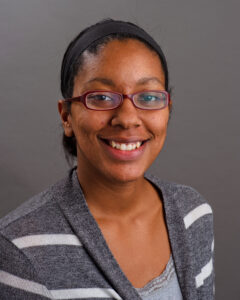Dr. Jennifer Sykes has always known that she had a passion for parenting dynamics and helping parents understand their children’s behaviors. Growing up in a large extended family, Sykes was able to see how different parenting skills and tactics played out among her siblings, cousins and other relatives.
“My mother would always tell me stories about her experiences growing up and our large extended family,” Sykes said. “I always was intrigued by the differences in parenting and family practices and how they appeared to impact individuals across their lifespan. It really motivated me to learn more about family dynamics and which parenting behaviors encouraged better outcomes for children.”
To pursue this path, Sykes earned her undergraduate degree in psychology from Spelman College in Atlanta followed by a master’s degree at Fayetteville State University. Sykes then made her way to Columbia where she earned her doctorate in counseling psychology at the University of Missouri.
Sykes first got her feet wet performing assessments and diagnostic evaluations as a part of her doctoral work with Thompson Center faculty Dr. Connie Brooks and Dr. Andy Knoop at the University of Missouri Assessment and Consultation Clinic (ACC). Her dissertation research and internship experiences focused on identifying parenting challenges and supporting parents’ efforts to improve their children behaviors and emotional functioning. After finishing her degree Sykes accepted a postdoctoral fellowship at the Thompson Center.
“I always knew I wanted to work with children and parents, but my experience working at the ACC lead to me falling in love with diagnostic work and my time at the Thompson Center solidified by interest in autism spectrum disorders,” Sykes said.
Following her fellowship, Sykes spent a year and a half performing autism assessments and individual counseling with individuals with developmental disabilities at the Southeast Missouri State University Autism Center. In late 2017, Sykes accepted a position back at the Thompson Center on faculty as an assistant clinical professor of health psychology in the MU School of Health Professions. In this role, Sykes performs five diagnostic evaluations week, diagnosing patients with autism and other neurodevelopmental disorders.
Sykes says the amazing opportunities and resources available for Thompson Center patient families are what drew her back to Columbia. Sykes and her husband now have two children, three-year-old and five-month-old girls, which she says makes her work all the more important to her.
“Now that I have children of my own, it makes this work all the more visceral,” Sykes said. “It really feeds my desire to build additional supports for families even above and beyond what the Thompson Center already offers.”
Sykes hopes to develop additional resources and support programs for families with questions of autism, even before they receive diagnoses.
“So much misinformation about ASD currently exists out there that parents often come in with misconceptions about their children’s behaviors,” Sykes said. “If we can help build resources full of good, reliable information for families, it will help relieve a lot of the stress parents often feel before, during and following the ASD diagnostic process.”
With Dr. Sykes on the case, the present and future of parental and family support at the Thompson Center has never been stronger.


